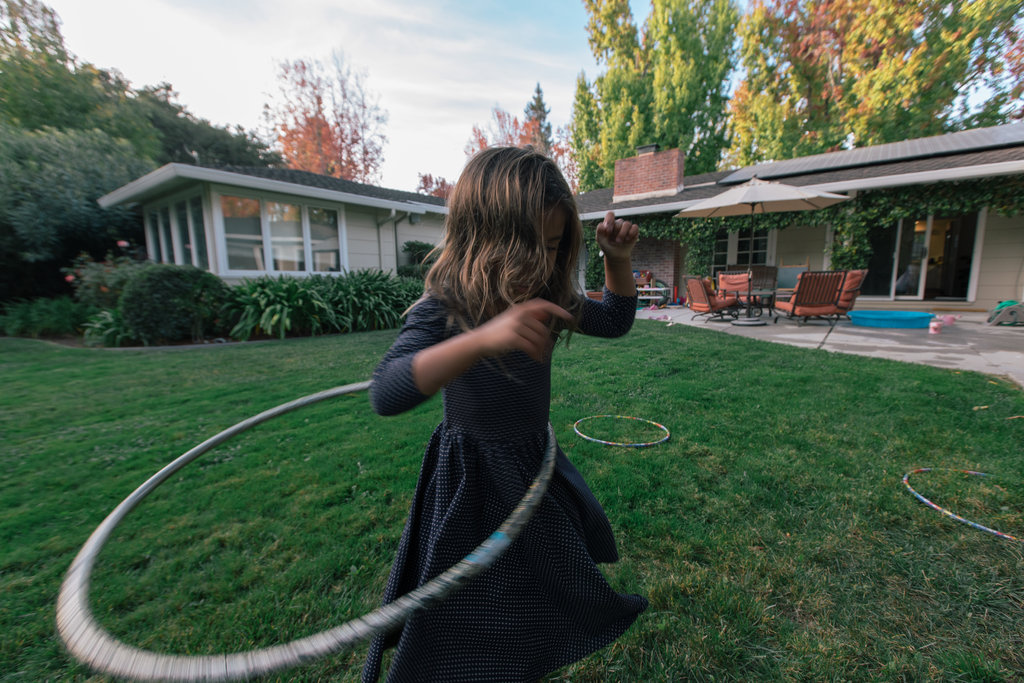Gloomy consensus on children and screens begins to form in Silicon Valley
"I am convinced that the devil lives in our phones"

People closest to the phenomenon, often refer to it more wary than others. Technologists know how telephones actually work, and many of them have decided that they do not want their children to touch them.
Slowly growing anxiety turns into a pervasive consensus: the benefits of screens as a device for learning are exaggerated, and the risks of habituation and retardation are great. Now in Silicon Valley they are arguing about what time to use phones as normal.
')
“It’s almost easier to completely ban access to the phone than to limit it,” said Christine Stecher, a former social computing researcher who is married to a Facebook programmer. "If my children get a little access, they want more."
Stecher, 37 years old, and her husband, Rushab Doshi, conducted research on the time of communication with gadgets and came to a simple conclusion: they want to almost completely ban them in their home. Their daughters aged 5 and 3 have no “budget” for using gadgets, there are no dedicated hours they can spend in front of the screen. The screen can be used only on long journeys by car (including a four-hour trip to the Tahoe) or during the flight by plane.
She recently softened conditions. Every Friday evening, the family watches one movie.
Stecher seems that this problem will be exacerbated in the future: her husband, 39, loves video games and believes that they can be educational and entertaining. She doesn't think so.
“We’ll cross this bridge when we get to it,” said Stetscher, who will soon have a boy.
Some people who create videos are horrified by how many opportunities today's children have to watch a video.
Hunter Walk, a venture capitalist who for years managed product development for YouTube on Google, in response to a question about time limit on gadgets for children, sent a photo of a baby pot for teaching a toilet to a toilet with an iPad attached to it, and attributed: “Hashtag„ products that we did not buy "."

Athena Chavaria, formerly an administrative assistant on Facebook, now an employee of the Zuckerberg Charity Department of the Chan Zuckerberg Initiative, said: "I am convinced that the devil lives in our phones, destroying the lives of our children."
Chavaria did not allow her children to use cell phones down to the upper classes, and even now prohibits their use in the car and severely restricts them at home. She said that she lived with the conviction that the child who wins the phone last will win out of the whole class. She did not buy the phone to her daughter until she went to the ninth grade.
“Other parents ask me,“ Am I worried that I do not know where my children are when I cannot find them? - said Chavaria. “And I say,“ No, I don’t have to know the location of my children at any second. ”
For the leaders of the technoindustrial industry, the spectacle of how the tools they create affect their children was paid for their lives and work. Among them - Chris Anderson, a former editor of Wired, and now - the director of the company that produces drones and robots. He also founded GeekDad.com.
“On a scale from candy to crack cocaine, they are closer to the latter,” Anderson said about gadgets. He added that the technologists who create these products and the authors who review the technical revolution were naive.
“We thought we could control it,” said Anderson. “But control over them is beyond our means.” All this goes directly to the pleasure center of the developing brain. We, like ordinary parents, are not able to understand this. ”
He has five children and 12 rules for handling technology. Among them: no phones before the holidays in front of the upper classes, no screens in the bedroom, blocking content at the network level, no social networks up to 13 years old, no iPads, the schedule for using gadgets is regulated via Google WiFi from his phone. For the bad behavior of the child for a day sent to offline.
“I didn’t know what we were doing with their brains until I began to observe the symptoms and effects,” said Anderson.

Anderson Family Schedule
“We have learned all this in our own skin. “We made all the known mistakes, and I think that I also made a mistake with some of my children,” said Anderson. - We looked into the abyss of addiction, and lost a few years, because of what we feel bad. "
His children attended a private primary school, where, in front of his eyes, the administration introduced iPads and smart boards into the training, so that everything “plunged into chaos and then had to get out of it”.
The idea that parents from Silicon Valley are worried about technology is not new. The founding fathers of technology have been expressing such fears for many years, and the higher the position, the more anxious.
Tim Cook, Apple's director this year, said he would not allow his nephew to register on social networks. Bill Gates forbade children from using cell phones until they became teenagers. Melinda Gates wrote that she would like this period to last longer. Steve Jobs did not let his little children go to iPads.
But over the past year, a whole gang of deserters from Silicon Valley began to sound the alarm, using increasingly loud descriptions of what these gadgets do to the human brain. Suddenly this obsession overtook the ordinary employees of the companies of the Valley. Across the region, there are “houses without technology”. Nurses are asked to sign contracts to ban the use of telephones.
People who have exposed their children to gadgets are trying to dissuade them from addiction to them, explaining how technology works. John Lily, a Silicon Valley venture capitalist from Greylock Partners, and a former Mozilla director, said he was trying to help his 13-year-old son understand that the creators of the technology are manipulating him.
“I'm trying to explain to him that someone wrote the code so that he felt that way, trying to help him understand how everything is done, understand the value of things and what people do to create such a feeling,” said Lilly. - And he says "I just want to spend 20 bucks on skins for Fortnite."
In tehnomir there are people who disagree with the danger of gadgets. Jason Toph, 32, who ran the Vine video platform and now works at Google, allows his three-year-old son to play on the iPad, not considering it better or worse than a book. This opinion is rather unpopular among his colleagues, so that he feels “branded”.
"Just yesterday I received such a reaction: Doesn't it bother you that all directors of the technology industry limit the use of gadgets? Said Toff. - And I replied that maybe I should be worried, but I was always skeptical about the norms. People are just afraid of the unknown. "
“I feel like a black sheep,” said Toff. “But it seems to me that I speak on behalf of many parents who are afraid to speak out so that they will not be convicted of this.” He says that he looks back on his childhood when he grew up in front of the TV. “I think everything is fine with me,” said Toff.
Other parents from Silicon Valley say there are ways to reduce the toxicity of limited access to gadgets. Rene Direst, a security researcher from the board of directors of the Center for Humanitarian Technologies, does not allow passive use of gadgets, but allows spending a little time on complex games.
She, using her knowledge of the nature of gadgets, wants her children, 2 and 4 years old, to learn how to program at a young age. But she distinguishes between methods of their use. You can play a creative game, but watching a YouTube video is prohibited, except in the family circle.
Frank Barbieri, director of PebblePost from San Francisco, who tracks people online to send targeted advertisements, is trying to limit the use of gadgets to his five-year-old daughter with content in Italian. “We have friends, opponents of gadgets, and we have friends that belong to them freely,” said Barbieri. He read studies that learning a second language at a young age helps brain development, so his daughter watches movies and TV shows in Italian. “My wife and I just thought which country we would like to visit,” said Barbieri.
Source: https://habr.com/ru/post/429364/
All Articles